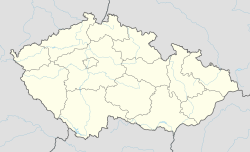Hnojník
|
Hnojník Gnojnik |
|||
|---|---|---|---|
| Village | |||

Château in Hnojník
|
|||
|
|||
| Location in the Czech Republic | |||
| Coordinates: 49°40′52″N 18°32′21″E / 49.68111°N 18.53917°ECoordinates: 49°40′52″N 18°32′21″E / 49.68111°N 18.53917°E | |||
| Country | Czech Republic | ||
| Region | Moravian-Silesian | ||
| District | Frýdek-Místek | ||
| First mentioned | 1305 | ||
| Government | |||
| • Mayor | Miroslav Molin | ||
| Area | |||
| • Total | 6.41 km2 (2.47 sq mi) | ||
| Elevation | 365 m (1,198 ft) | ||
| Population (2006) | |||
| • Total | 1,487 | ||
| • Density | 230/km2 (600/sq mi) | ||
| Postal code | 739 53 | ||
| Website | www |
||
![]() Hnojník (Polish: Gnojnik , German: Hnoynik, Gnoynik) is a village in Frýdek-Místek District, Moravian-Silesian Region, Czech Republic, on the Stonávka River. It has a population of 1,446 (2001 census); 11.5% of the population are Poles.
Hnojník (Polish: Gnojnik , German: Hnoynik, Gnoynik) is a village in Frýdek-Místek District, Moravian-Silesian Region, Czech Republic, on the Stonávka River. It has a population of 1,446 (2001 census); 11.5% of the population are Poles.
The village was first mentioned in a Latin document of Diocese of Wrocław called Liber fundationis episcopatus Vratislaviensis from around 1305 as item in Gnoynik. It meant that the village was in the process of location (the size of land to pay a tithe from was not yet precised). The creation of the village was a part of a larger settlement campaign taking place in the late 13th century on the territory of what will be later known as Upper Silesia.
Politically the village belonged initially to the Duchy of Teschen, formed in 1290 in the process of feudal fragmentation of Poland and was ruled by a local branch of Piast dynasty. In 1327 the duchy became a fee of the Kingdom of Bohemia, which after 1526 became part of the Habsburg Monarchy.
...
Wikipedia



